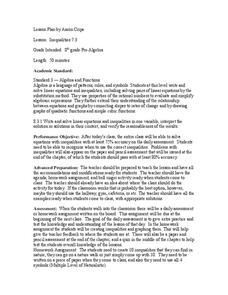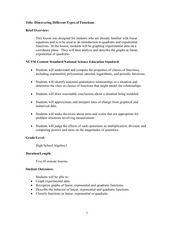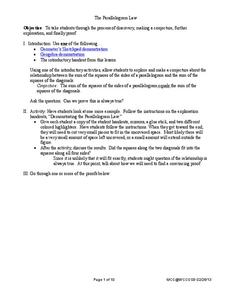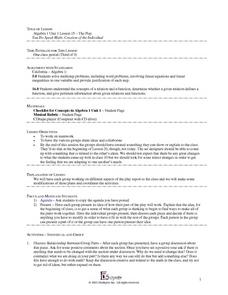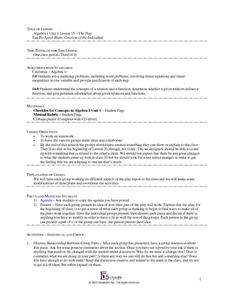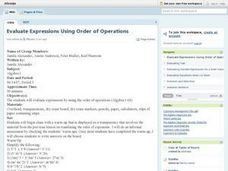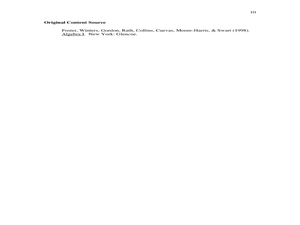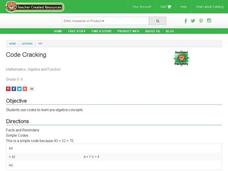Curated OER
Inequalities 7.3
Graph inequalities and discuss the difference in their slopes. Learners observe rate of change as they compare linear, quadratic, and cubic functions.
Curated OER
The Tortoise And The Hare
Students use the children's story of The Tortoise And The Hare in order to investigate the graphing of equations. The story is converted to an algebraic word problem for them to solve. Students investigate the relationships of data and...
Curated OER
Representation of Quadratic Functions
Students use a table, graph or equation to represent a quadratic function. In this algebra lesson, students model and graph with quadratic function. They become comfortable representing quadratics using different methods.
Curated OER
Discovering Different Types of Functions
Graph polynomials and identify the end behavior of each polynomial function. The class differentiates between linear, quadratic, and other polynomial equations.
Curated OER
Polynomials Functions
High schoolers factor polynomials and linear functions and apply concepts of the fundamental theorem of algebra to solve problems. They graph their solutions and analyze the graph.
West Contra Costa Unified School District
The Parallelogram Law
Use your pupils' sense of curiosity to explore the Parallelogram Law. Here is an activity that outlines a complete lesson from beginning to end, allowing pupils to follow a conjecture through to the proof stage.
Curated OER
Solving Systems of Equations
Learners explore the concept of solving systems of equations with two equations and two unknowns. In this solving systems of equations lesson, they work through problems of solving systems by substitution, elimination, and graphing....
Curated OER
Algebra I: Multiplying Polynomials and Factoring
Students use concrete models (algebra blocks) to demonstrate their processes for solving quadratic equations. They apply the commutative, associative, and distributive properties to simplify algebraic expressions and to solve quadratic...
Curated OER
Algebra I: The Play
Students create their plays to demonstrate concepts from Algebra I. They collaborate in small groups to add music and dancing to their plays. They analyze the suggestions from the previous class as they revise their plays.
Curated OER
Algebra I: The Play
Young scholars revise their Algebra plays. They collaborate in small groups to work on different aspects of the play and report to the class. They make modifications to their plans and review the Musical Rubric to incorporate the...
Curated OER
Caterpillar Connections
Third graders investigate numerical and geometric patterns and express them in words or numbers. In this algebraic reasoning instructional activity, 3rd graders analyze the structure of the pattern and how it changes or grows,...
Curated OER
Who Won the Cross-Country Meet?
Students write verbal expressions into algebraic expressions and solve the expressions. They determine who wins a race by determining the algebraic expression.
Curated OER
The X Factor - Trinomials and Algebra Tiles
Students use algebra tiles to identify the binomial factors and the graphing calculator to verify the result. In addition, they will identify the x-intercepts and y-intercepts of each trinomial function and explore relationships between...
Curated OER
Basic Algebra - Lesson 4 Order of Operations
Ninth graders study the correct way to solve equations using the order of operations. They apply a mnemonic device to remember the proper order.
Curated OER
Algebra 1: Evaluating Expressions
Students discover how to apply the order of operations to evaluating algebraic expressions. In pairs, they solve problems by placing the order of operations steps in correct order. As an exit slip, students write paragraphs about an...
National Security Agency
A Balancing Act: Solving Multi-Step Equations
Wow! Put on that thinking cap and solve multi-step equations. To solve equations, learners review the use of the distributive property and combining like terms. This three-day lesson comes with about 20 pages of worksheets, warm-ups,...
Curated OER
Gold Rush California and its Diverse Population
Students compare contemporary cultural differences with historical differences based on population percentage. In this cross-curriculum Gold Rush/math lesson, students analyze aspects of California's Gold Rush population and diversity...
Curated OER
Supernova Chemistry
Using spectroscopes, high school astronomy, physics, or chemistry learners observe emission spectra from several different sources. This stellar NASA-produced lesson plan provides terrific teacher's notes and a student handout. Make sure...
Curated OER
Understanding Proportions and Scale Drawings
Proportions are ratios found using multiplication or division. Middle schoolers solve measurement problems, find a figure's missing dimension, and find the distance between two points. Resource features four lesson plans with detailed...
Curated OER
Which Method Will You Choose? Finding Solutions to Systems of Equations.
Ninth graders investigate systems of linear equations. In this Algebra I lesson, 9th graders determine which method is the best for solving a systems: graphing, substitution, or elimination. Students choose...
Curated OER
Slopes and Linear Equations
Students find the slopes of linear functions. For this graphing lesson, students analyze linear equations and calculate the slope of the line. They graph a line given the slope and y-intercept.
Curated OER
Code Cracking
There is nothing more engaging than cracking a secret code! Middle schoolers will replace letters with numbers to solve problems. This game will help them to begin to understand algebra questions by finding the value of missing numbers....
Curated OER
Cantilevers
Learners perform an experiment to find the linear relationship between the appllied weight and the bend of the cantilever. In this linear relationships lesson, students follow detailed directions to set up an experiment. They add weights...
Curated OER
Beginning Algebra Lesson
Students discuss how to add simple Algebra problems such as: 2x + 2x = 4x or 3x + 3x + 6x = 12x or 3(2x + 4x) = 3(6x) = 18x. They then examine how to do these problems by writing down examples on the board before Students do their...


